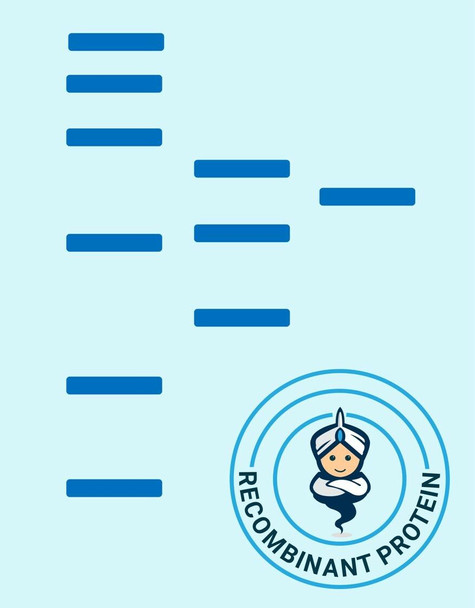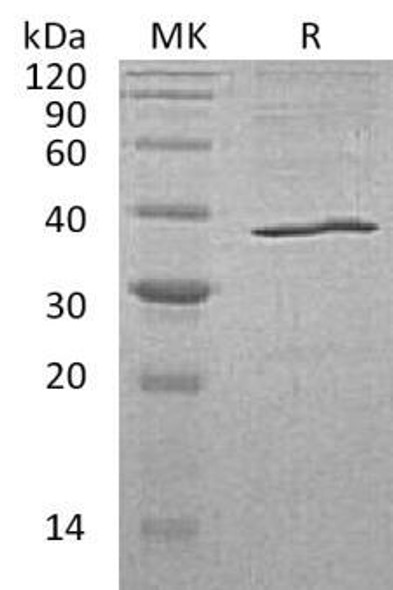Enzymes Recombinant Proteins
Human AKR1C3 Recombinant Protein (RPPB1374)
- SKU:
- RPPB1374
- Product Type:
- Recombinant Protein
- Species:
- Human
- Uniprot:
- P42330
- Research Area:
- Enzymes
Description
| Product Name: | Human AKR1C3 Recombinant Protein |
| Product Code: | RPPB1374 |
| Size: | 20µg |
| Species: | Human |
| Target: | AKR1C3 |
| Synonyms: | DD3, DDX, HAKRB, HAKRe, HA1753, HSD17B5, hluPGFS, KIAA0119, AKR1C3, Aldo-keto reductase family 1 member C3, 3-alpha-HSD type 2, 17-beta-HSD 5, PGFS, DD-3. |
| Source: | Escherichia Coli |
| Physical Appearance: | Sterile Filtered clear colorless solution. |
| Formulation: | The AKR1C3 solution contains 20mM Tris-HCl pH-8 and 10% glycerol. |
| Stability: | Store at 4°C if entire vial will be used within 2-4 weeks. Store, frozen at -20°C for longer periods of time. For long term storage it is recommended to add a carrier protein (0.1% HSA or BSA).Avoid multiple freeze-thaw cycles. |
| Purity: | Greater than 95.0% as determined by SDS-PAGE. |
| Amino Acid Sequence: | MGSSHHHHHH SSGLVPRGSH MDSKHQCVKL NDGHFMPVLG FGTYAPPEVP RSKALEVTKL AIEAGFRHID SAHLYNNEEQ VGLAIRSKIA DGSVKREDIF YTSKLWSTFH RPELVRPALE NSLKKAQLDY VDLYLIHSPM SLKPGEELSP TDENGKVIFD IVDLCTTWEA MEKCKDAGLA KSIGVSNFNR RQLEMILNKPGLKYKPVCNQ VECHPYFNRS KLLDFCKSKD IVLVAYSALG SQRDKRWVDP NSPVLLEDPV LCALAKKHKR TPALIALRYQ LQRGVVVLAK SYNEQRIRQN VQVFEFQLTA EDMKAIDGLD RNLHYFNSDS FASHPNYPYS DEY |
| Biological Activity: | Specific activity: approximately < 0.1 units/mg.Enzymatic activity was confirmed by measuring the amount of enzyme catalyzing the oxidation of 1 micromole NADPH per minute at 25C. Specific activity was expressed as units/mg protein. |
AKR1C3 is part of the aldo/keto reductase superfamily, which has at least 40 identified proteins. AKR1C3 catalyzes the conversion of aldehydes and ketones to their corresponding alcohols by utilizing NADH and/or NADPH as cofactors. AKR1C3 displays overlapping but distinct substrate specificity. AKR1C3 catalyzes the reduction of prostaglandin (PG) D2, PGH2 and phenanthrenequinone (PQ), and the oxidation of 9alpha,11beta-PGF2 to PGD2. AKR1C3 is involved in the pathogenesis of allergic diseases such as asthma. AKR1C3 controls cell growth and/or differentiation. AKR1C3 takes part in adrenal testosterone production. AKR1C3 expression is affected by metabolic disease, and its levels are considerably reduced in response to diet-induced weight loss and correlate with leptin levels.
AKR1C3 Human Recombinant fused to 20 amino acid His Tag at N-terminal produced in E.Coli is a single, non-glycosylated, polypeptide chain containing 343 amino acids (1-323 a.a.) and having a molecular mass of 39 kDa. The AKR1C3 is fused to a 20 amino acid His tag purified by proprietary chromatographic techniques.
| UniProt Protein Function: | AKR1C3: Catalyzes the conversion of aldehydes and ketones to alcohols. Catalyzes the reduction of prostaglandin (PG) D2, PGH2 and phenanthrenequinone (PQ) and the oxidation of 9-alpha,11-beta- PGF2 to PGD2. Functions as a bi-directional 3-alpha-, 17-beta- and 20-alpha HSD. Can interconvert active androgens, estrogens and progestins with their cognate inactive metabolites. Preferentially transforms androstenedione (4-dione) to testosterone. Belongs to the aldo/keto reductase family. |
| UniProt Protein Details: | Protein type:Lipid Metabolism - arachidonic acid; Oxidoreductase; EC 1.1.1.149; Xenobiotic Metabolism - metabolism by cytochrome P450 Chromosomal Location of Human Ortholog: 10p15-p14 Cellular Component: cytoplasm; intracellular; nucleus; cytosol Molecular Function:15-hydroxyprostaglandin-D dehydrogenase (NADP+) activity; delta4-3-oxosteroid 5beta-reductase activity; aldo-keto reductase activity; prostaglandin-F synthase activity; 3-alpha(17-beta)-hydroxysteroid dehydrogenase (NAD+) activity; 3(or 17)-alpha-hydroxysteroid dehydrogenase activity; retinol dehydrogenase activity; phenanthrene 9,10-monooxygenase activity; oxidoreductase activity, acting on NADH or NADPH, quinone or similar compound as acceptor; testosterone 17-beta-dehydrogenase (NADP+) activity; ketosteroid monooxygenase activity; trans-1,2-dihydrobenzene-1,2-diol dehydrogenase activity; ketoreductase activity; indanol dehydrogenase activity; aldehyde reductase activity; geranylgeranyl reductase activity; retinal dehydrogenase activity Biological Process: steroid metabolic process; phototransduction, visible light; retinal metabolic process; cyclooxygenase pathway; male gonad development; progesterone metabolic process; cellular response to starvation; prostaglandin metabolic process; keratinocyte differentiation; G-protein coupled receptor protein signaling pathway; positive regulation of protein kinase B signaling cascade; protein import into nucleus, translocation; positive regulation of cell proliferation; arachidonic acid metabolic process; multicellular organismal macromolecule metabolic process; farnesol catabolic process; retinoid metabolic process; regulation of retinoic acid receptor signaling pathway; response to nutrient |
| NCBI Summary: | This gene encodes a member of the aldo/keto reductase superfamily, which consists of more than 40 known enzymes and proteins. These enzymes catalyze the conversion of aldehydes and ketones to their corresponding alcohols by utilizing NADH and/or NADPH as cofactors. The enzymes display overlapping but distinct substrate specificity. This enzyme catalyzes the reduction of prostaglandin (PG) D2, PGH2 and phenanthrenequinone (PQ), and the oxidation of 9alpha,11beta-PGF2 to PGD2. It may play an important role in the pathogenesis of allergic diseases such as asthma, and may also have a role in controlling cell growth and/or differentiation. This gene shares high sequence identity with three other gene members and is clustered with those three genes at chromosome 10p15-p14. Three transcript variants encoding different isoforms have been found for this gene. [provided by RefSeq, Dec 2011] |
| UniProt Code: | P42330 |
| NCBI GenInfo Identifier: | 308153646 |
| NCBI Gene ID: | 8644 |
| NCBI Accession: | P42330.4 |
| UniProt Related Accession: | P42330 |
| Molecular Weight: | |
| NCBI Full Name: | Aldo-keto reductase family 1 member C3 |
| NCBI Synonym Full Names: | aldo-keto reductase family 1 member C3 |
| NCBI Official Symbol: | AKR1C3�� |
| NCBI Official Synonym Symbols: | DD3; DDX; PGFS; HAKRB; HAKRe; HA1753; HSD17B5; hluPGFS�� |
| NCBI Protein Information: | aldo-keto reductase family 1 member C3 |
| UniProt Protein Name: | Aldo-keto reductase family 1 member C3 |
| UniProt Synonym Protein Names: | 17-beta-hydroxysteroid dehydrogenase type 5; 17-beta-HSD 5; 3-alpha-HSD type II, brain; 3-alpha-hydroxysteroid dehydrogenase type 2 (EC:1.1.1.357); 3-alpha-HSD type 2; Chlordecone reductase homolog HAKRb; Dihydrodiol dehydrogenase 3; DD-3; DD3; Dihydrodiol dehydrogenase type I; HA1753; Indanol dehydrogenase (EC:1.1.1.112); Prostaglandin F synthase (EC:1.1.1.188); PGFS; Testosterone 17-beta-dehydrogenase 5 (EC:1.1.1.239, EC:1.1.1.64); Trans-1,2-dihydrobenzene-1,2-diol dehydrogenase (EC:1.3.1.20) |
| UniProt Gene Name: | AKR1C3�� |
| UniProt Entry Name: | AK1C3_HUMAN |






